Module 12 Western music 模块导学案
文档属性
| 名称 | Module 12 Western music 模块导学案 | 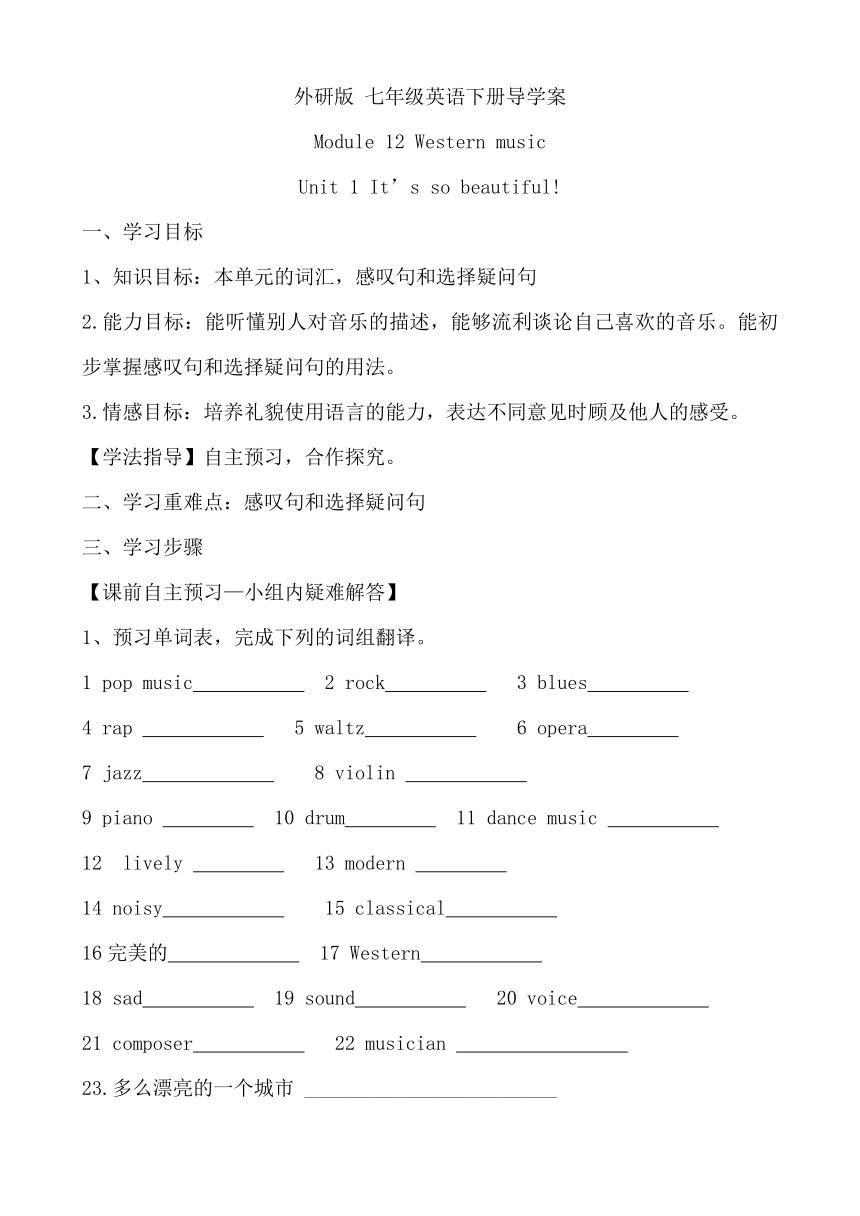 | |
| 格式 | zip | ||
| 文件大小 | 27.1KB | ||
| 资源类型 | 教案 | ||
| 版本资源 | 外研版 | ||
| 科目 | 英语 | ||
| 更新时间 | 2015-04-25 16:14:11 | ||
图片预览

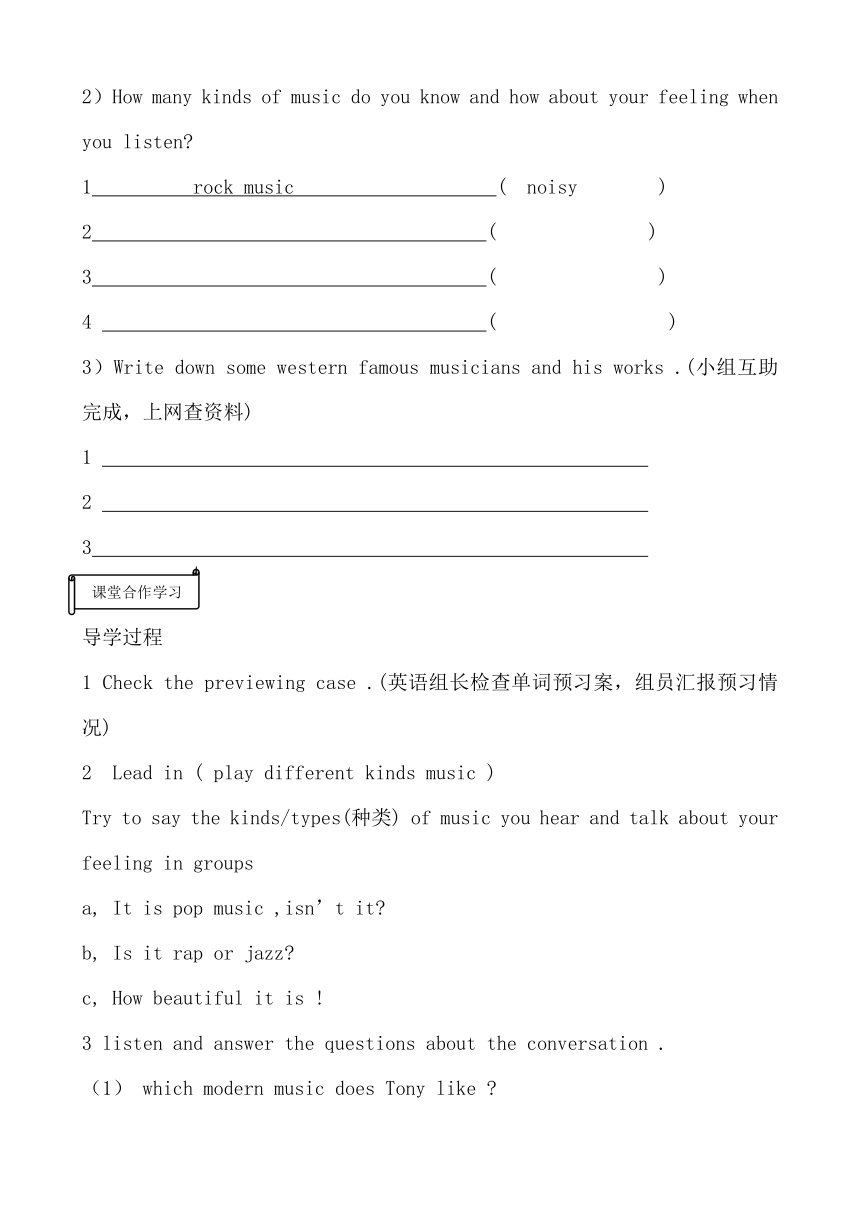
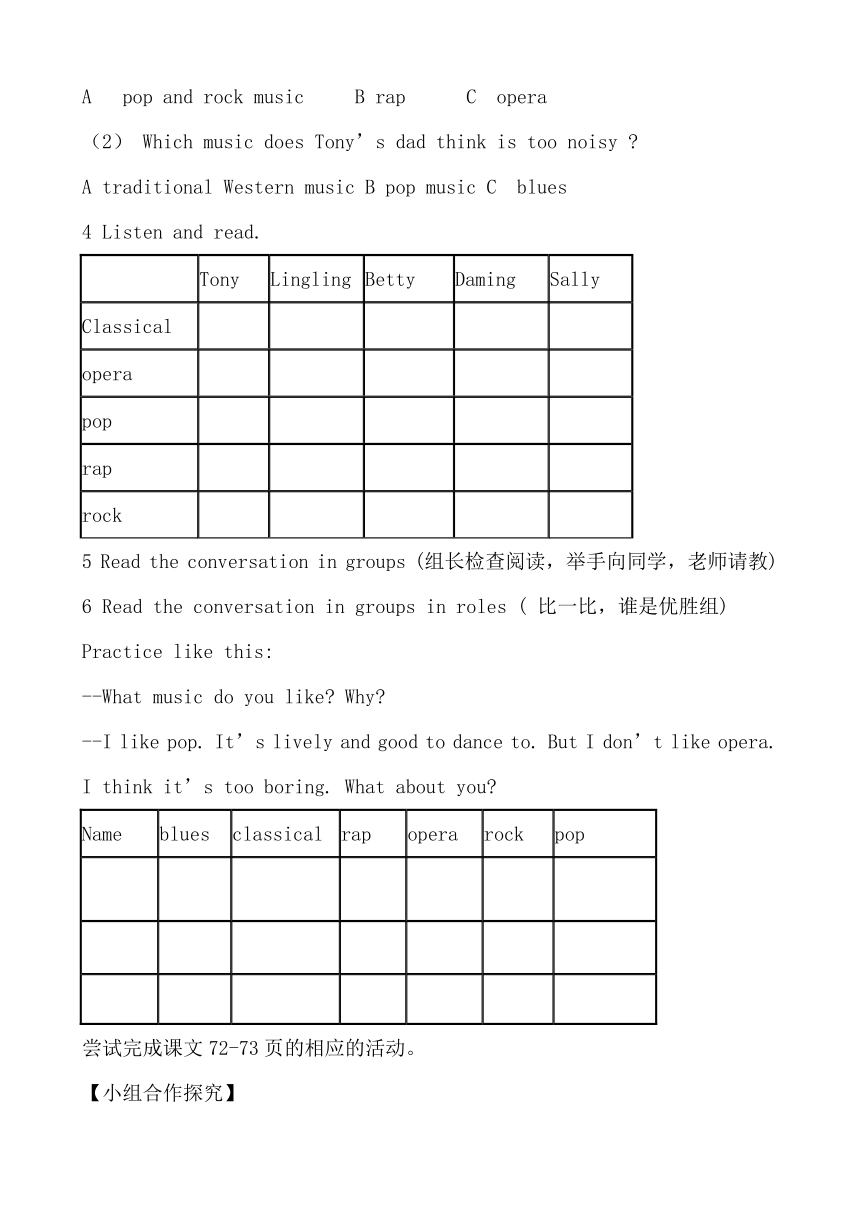
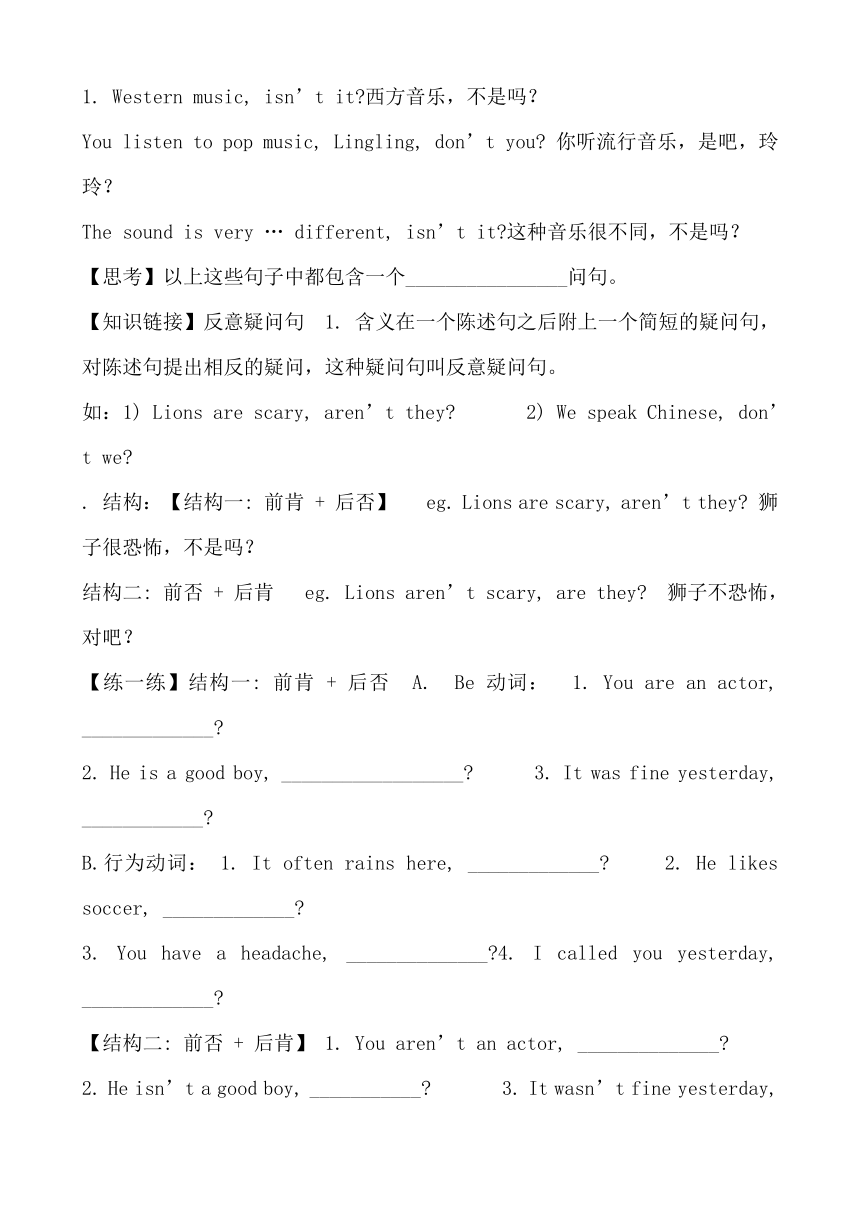
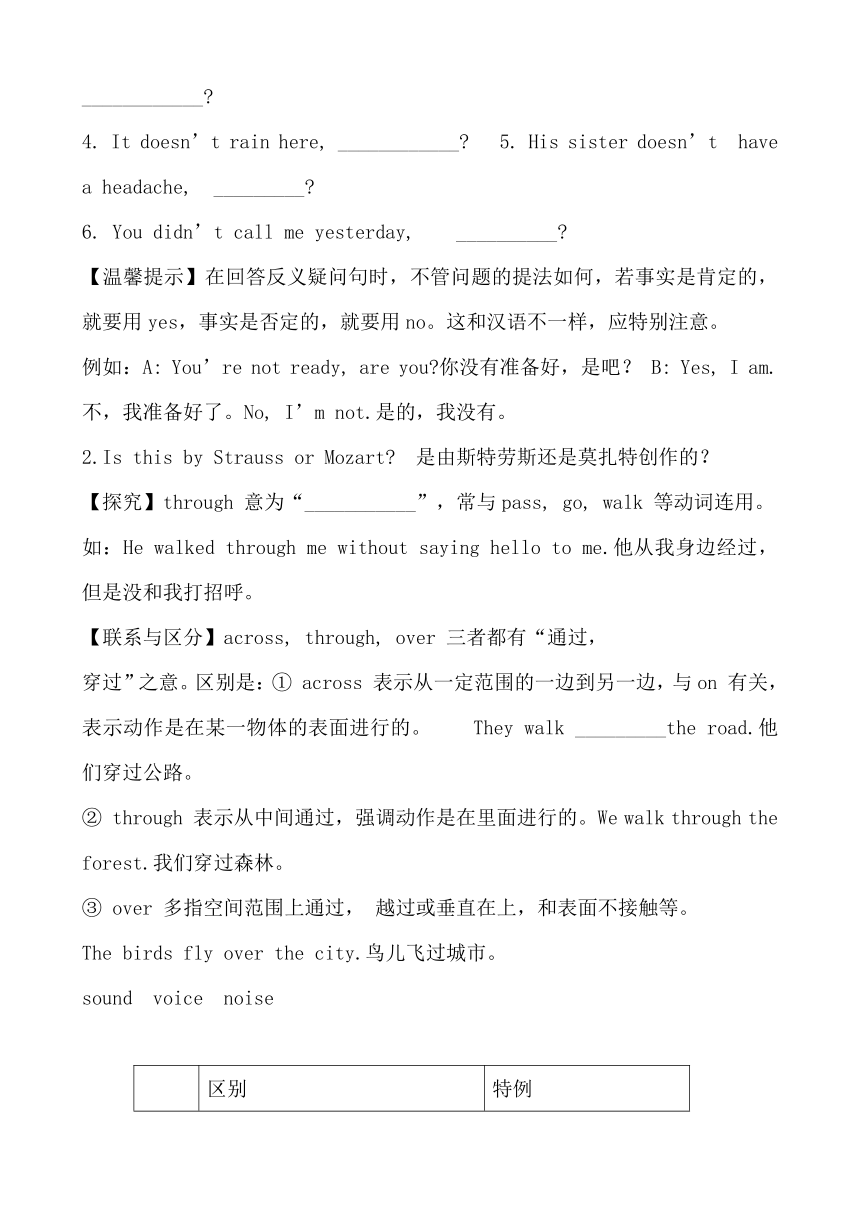
文档简介
外研版 七年级英语下册导学案
Module 12 Western music
Unit 1 It’s so beautiful!
一、学习目标
1、知识目标:本单元的词汇,感叹句和选择疑问句
2.能力目标:能听懂别人对音乐的描述,能够流利谈论自己喜欢的音乐。能初步掌握感叹句和选择疑问句的用法。
3.情感目标:培养礼貌使用语言的能力,表达不同意见时顾及他人的感受。
【学法指导】自主预习,合作探究。
二、学习重难点:感叹句和选择疑问句
三、学习步骤
【课前自主预习—小组内疑难解答】
1、预习单词表,完成下列的词组翻译。
1 pop music 2 rock 3 blues
4 rap 5 waltz 6 opera
7 jazz 8 violin
9 piano 10 drum 11 dance music
12 lively 13 modern
14 noisy 15 classical
16完美的 17 Western
18 sad 19 sound 20 voice
21 composer 22 musician
23.多么漂亮的一个城市 _________________________
2)How many kinds of ( http: / / www.21cnjy.com )music do you know and how about your feeling when you listen
1 rock music ( noisy )
2 ( )
3 ( )
4 ( )
3)Write down some wes ( http: / / www.21cnjy.com )tern famous musicians and his works .(小组互助完成,上网查资料)
1
2
3
导学过程
1 Check the previewing case .(英语组长检查单词预习案,组员汇报预习情况)
2 Lead in ( play different kinds music )
Try to say th ( http: / / www.21cnjy.com )e kinds/types(种类) of music you hear and talk about your feeling in groups
a, It is pop music ,isn’t it
b, Is it rap or jazz
c, How beautiful it is !
3 listen and answer the questions about the conversation .
(1) which modern music does Tony like
A pop and rock music B rap C opera
(2) Which music does Tony’s dad think is too noisy
A traditional Western music B pop music C blues
4 Listen and read.
Tony Lingling Betty Daming Sally
Classical
opera
pop
rap
rock
5 Read the conversation in groups (组长检查阅读,举手向同学,老师请教)
6 Read the conversation in groups in roles ( 比一比,谁是优胜组)
Practice like this:
--What music do you like Why
--I like pop. It’s ( http: / / www.21cnjy.com )lively and good to dance to. But I don’t like opera. I think it’s too boring. What about you
Name blues classical rap opera rock pop
尝试完成课文72-73页的相应的活动。
【小组合作探究】
1. Western music, isn’t it 西方音乐,不是吗?
You listen to pop music, Lingling, don’t you 你听流行音乐,是吧,玲玲?
The sound is very … different, isn’t it 这种音乐很不同,不是吗?
【思考】以上这些句子中都包含一个________________问句。
【知识链接】反意疑问句 1. 含义在一个陈述句之后附上一个简短的疑问句,对陈述句提出相反的疑问,这种疑问句叫反意疑问句。
如:1) Lions are sc ( http: / / www.21cnjy.com )ary, aren’t they 2) We speak Chinese, don’t we
. 结构:【结构一: 前肯 + 后否】 eg. Lions are scary, aren’t they 狮子很恐怖,不是吗?
结构二: 前否 + 后肯 eg. Lions aren’t scary, are they 狮子不恐怖,对吧?
【练一练】结构一: 前肯 + 后否 A. Be 动词: 1. You are an actor, _____________
2. He is a good b ( http: / / www.21cnjy.com )oy, __________________ 3. It was fine yesterday, ____________
B.行为动词: 1. It often ra ( http: / / www.21cnjy.com )ins here, _____________ 2. He likes soccer, _____________
3. You have a ( http: / / www.21cnjy.com ) headache, ______________ 4. I called you yesterday, _____________
【结构二: 前否 + 后肯】 1. You aren’t an actor, ______________
2. He isn’t ( http: / / www.21cnjy.com )a good boy, ___________ 3. It wasn’t fine yesterday, ____________
4. It doesn’t rain ( http: / / www.21cnjy.com )here, ____________ 5. His sister doesn’t have a headache, _________
6. You didn’t call me yesterday, __________
【温馨提示】在回答反义疑问句时,不管问题的提法如何,若事实是肯定的,就要用yes,事实是否定的,就要用no。这和汉语不一样,应特别注意。
例如:A: You’re not re ( http: / / www.21cnjy.com )ady, are you 你没有准备好,是吧? B: Yes, I am. 不,我准备好了。No, I’m not.是的,我没有。
2.Is this by Strauss or Mozart 是由斯特劳斯还是莫扎特创作的?
【探究】through 意为“___________”,常与pass, go, walk 等动词连用。
如:He walked through me without saying hello to me.他从我身边经过,但是没和我打招呼。
【联系与区分】across, through, over 三者都有“通过,
穿过”之意。区别是:① acros ( http: / / www.21cnjy.com )s 表示从一定范围的一边到另一边,与on 有关,表示动作是在某一物体的表面进行的。 They walk _________the road.他们穿过公路。
② through 表示从中间通过,强调动作是在里面进行的。We walk through the forest.我们穿过森林。
③ over 多指空间范围上通过, 越过或垂直在上,和表面不接触等。
The birds fly over the city.鸟儿飞过城市。
sound voice noise
区别 特例
sound 声音 / 声响 / 声(泛指人听到的一切声音) the sound of music
voice 嗓音 / 说话声(人发出的说话声、歌声等) speak in a loud voice
noise 噪音 / 吵闹声/杂音(不悦耳的声音) make so much noise
a. The ____________ of the cars outside woke me up early this morning.
b. The best woman ( http: / / www.21cnjy.com ) singer of the year has got a sweet _____________.
No wonder she is so popular.
c. We know light travels much faster than ____________.
d. The students ar ( http: / / www.21cnjy.com )e always asked not to make much _________ in class.
【课堂巩固练习】一、用所给单词或单词的首字母适当形式填空。
1. England is a ______________ (west) country.
2. I love ________________ (tradition) Beijing Opera.
3. – Is there a ( http: / / www.21cnjy.com ) student _____________ (call) Wang Dong in your class -- Yes, there is.
4. I don’t b__________ him. 5. He was b_____ in Vienna, the c_______ of Austria.
6. He was one of the greatest American m_______________.
二、单项选择 ( ) 1. He is a football fan, __________
A. is he B. isn’t he C. does he D. doesn’t he
( ) 2. He is from ________ , and he is a handsome _______ boy.
A. Australia; Australia B. Austria; Australian
C. Australia; Australian D. Australia; Austria
( ) 3. Daniel di ( http: / / www.21cnjy.com )dn’t like to do that, did he “______________ ”.
A. No, he didn ( http: / / www.21cnjy.com )’t. B. Yes, he didn’t like toC. No, he didn’t liked D. Yes, he liked
( ) 4. Strauss ( http: / / www.21cnjy.com ) is ________ European musician. A. a B. an C. the D. /
( ) 5. – Who i ( http: / / www.21cnjy.com )s the beautiful music __________ -- I think Jay Chou wrote it.
A. for B. by C. to D. in
( ) 6. Don’t be careless again, ___________
A. are you B. do you C. did you D. will you
( ) 7. Go and get some water, _____________
A. won’t you B. don’t you C. shall you D. would you
( ) 8. There was little bread in the cupboard, _________
A. weren’t there B. was it C. was there D. wasn’t there
( ) 9 Susan can ( http: / / www.21cnjy.com )’t drive, _____ A. does she B. is she C. not she D. can she
( ) 10 The river ( http: / / www.21cnjy.com )runs ___ the forest. A. through B. over C. across D. on
( ) 11.Young people like listening to music ______ Jay Chou.
A. of B. to C. with D. by
【学后反思】:对于本单元的学习,还存在哪些疑惑?并且请你简单地总结。
【能力提升】 完成下列反意疑问句。1 He is in Class One, ____________
2 You don’t speak ( http: / / www.21cnjy.com )English, ________ 3 They have been to China, ________
4 Your uncle didn’t return yesterday, ______
5 There are ten pandas in the zoo, ___________
6. You won’t go to USA, _________
7. There isn’t a boy in our classroom, _________
8. There weren’t many cars in the street, ___________
9. Don’t smoke, __________ 10. Let’s not do it, _________
Module 12 Western music
Unit 2 Vienna is the centre of European classical music.
一、学习目标
1、知识目标:本单元的词汇,感叹句和选择疑问句
2.能力目标:能读懂有关音乐及人物描写方面的文章,掌握介绍人物的方法。
3.情感目标:培养礼貌使用语言的能力,表达不同意见时顾及他人的感受。
【学法指导】自主预习,合作探究?课文课文102-103页模块12感叹句和选择疑问句。
二、学习重难点 感叹句和选择疑问句
三、学习步骤
【课前自主预习】
一.大声朗读课文的对话,自主找一找对话里出现的感叹句和选择疑问句,并理解其用法。
二、预习课文,完成下列的词组翻译。(来做个小小翻译家哦)
1. European_____________ 2. musician ____________ 3. composer________________
4. classical music ( http: / / www.21cnjy.com )___________ 5. elder____________ 6. century______________
7. 华尔兹舞(曲)___________________ 8. 舞曲______________
9. 又一个;再一个____________________ 10。完美的_________________
11(写作、音乐或艺术的)作品_____________ 12. 贫穷的_________________
13.美丽又古老的城市 _________________________ 14.重要的_____________
15他是一位了不起的欧洲音乐家。___________________________________________
合作探究
三、讨论与交流
1 Warm up:Look at the picture and answer the question.(PPT)
Where is it
2 Fast reading.
3 Read and check.
1)Vienna is the centre of European________.
A.modern music
B.rock music
C.classical music
D.country music
2)How many composers are talked
about in this passage
A.Two
B.Three
C.Four
D.Five
3)Johann Strauss the younger wrote
the Blue Danube_______
.A.in 1756
B.in 1791
C.in 1825
D.in 1867
4 Read again and finish A2.
5 Read and finish A3.
6 Finish A4.
7 .【课堂巩固】根据课文内容填空。
Vienna is a beaut ( http: / / www.21cnjy.com )iful old city on the river Danube. It’s the ____________ city of Austria and the _________ of European classical music.
There were two __________ called Johann Strauss: a ________ and a _________. The father wrote and played music for a classical dance — __________. His waltzes made him famous all over _____________.
Johann Strauss the ( http: / / www.21cnjy.com )younger, was even more __________ and ___________ than his father. He wrote ________ 150 waltzes and his most __________ one was The Blue Danube. He wrote it in 1867. Strauss and Mozart were two of the most __________ composers.
四、课堂检测
I.完成句子
1.他不仅会讲英语,而且还会讲俄语。
He can speak____________English____________Russian.
2.北京是中国的首都。
Beijing is_____________________China.
3.数百人参加了这次会议。
_______________people attended this meeting.
4.昨天校长领我们参观了这所学校。
The head teacher
__________________the school yesterday.
5.这个公园位于市中心。
The park is_________________________the city.
6.他在全中国深受欢迎。
He is popular____________China.
II.拓展延伸
维也纳(奥地利的首都)维也纳是奥地利的首都,同时也是奥地利的9个联邦州之一,是奥地利最大的
城市和政治中心,位于多瑙河畔 ( http: / / www.21cnjy.com )。维也纳是联合国的四个官方驻地之一,除此之外维也纳也是石油输出国组织、欧洲安全与合作组织和国际原子能机构的总部以及其他国际机构的所在地。2011年11月30日,维也纳以其华丽的建筑、公园与广阔的自行车网络登上全球最宜人居城市冠军。因市内古典音乐气氛浓厚,引来各国音乐家聚集于此,具“世界音乐之都”和“乐都”等美誉。第一次世界大战以前是领域曾遍及除德意志以外的中东欧大部分地区的奥匈帝国首都。按照市区人口,它是欧盟第七大城。在20世纪初以前,它是世界上最大的德语城市,奥匈帝国分裂之前,该市已经拥有200万人口。今天它仍是第二大德语城市,仅次于柏林。其市中心古城区被列为世界遗产。
知识点梳理。
1. His dance music
made him famous
all over Europe.
他的舞曲使他闻名于整个欧洲。
◆The boss made the workers do the work all day.
老板迫使工人们整天干活。
◆We made him our monitor.
我们选他当班长。
【探究总结】
make的用法
(1)make+sb. /sth. +adj.
意为“使某人/
某物(怎么样)”。
(2)make+sb. /sth. +n意为“使某人\某物成为……”。
(3)make+sb. +do sth. 意为“使某人做某事”。
【练习】
My uncle likes telling stories and his stories often make us______.
A.laugh
B.laughing
C.to laugh
D.laughs
2.another pron 又一个;再一个
◆Mozart was another very important composer.
◆This sweater is too big for me.Could you show me another one
◆May I have another two bananas
我可以再吃两个香蕉吗?
【探究总结】
another的用法
(1)another用作形容词,意为“又一个的;再一个的”,指三者或三者以上中的另一个,其后接可数名词单数。
(2)another用作代词,意为“又一个;再一个”,一般单独使用。
(3)another作“又;再”讲时,构成短语:another+数词+可数名词复数=数词+more+可数名词复数。
【练习】
①I don’t like this pen.Ple
ase show me______.
A.another
B.other
C.others
D.the other
②Americans like moving from one place to______.
A.the other
B.another
C.other
D.one more
3.not only...but also...不仅……而且……
◆Before he was six,he played not only the piano but also the violin.
◆Mr.Hu can speak not only English but also French.
◆The little g ( http: / / www.21cnjy.com )irl not only can play the piano but also can play the guitar.
【探究总结】
not only...but also...的用法
(1)not only...but als ( http: / / www.21cnjy.com )o...意为“不仅……而且……;既……又……”,常用来连接两个并列的成分。连接并列主语时,谓语动词要与邻近的主语保持一致(就近原则)。
(2)not only...but also ( http: / / www.21cnjy.com )...常与both...and...相互转换使用,但both...and...连接并列主语时,谓语动词要用复数。
【练习】
①Not only you but also he______(be)going to the cinema.
②Not only you but also Li Lei______(read)newspapers every day.
older与elder:两者都是old的比较级
(1)elder年龄较大的,资格较老的,尤指 ( http: / / www.21cnjy.com )家庭成员之间的长幼关系,通常作定语,不用于than引导的比较状语从句EG:He is my elder brother.他是我的哥哥。
(2)older指“年龄较大的;较老的;较旧的”,既可以作定语,也可以作表语可用于than引导的比较状语从句
EG:She is two years older than me.她比我大两岁。
【能力提升】一、根据中文提示完成句子。
1. Vienna is the ____________ ( 首都 ) city of Austria.
Mozart wrote his ________ ( 第一) opera at the age of 14.
Some people say Mozart was the __________ (最伟大的 ) European composer.
The pianist ____________ ( 死 ) when he was 37 years old.
Let’s play the game ____________ ( 一起 ).
There were two ( http: / / www.21cnjy.com ) composers ____________ ( 叫 ) Johann Strauss : a father and a son
Yong Tom was even more _____________ ( 成功 ) than his brother.
The students not ( http: / / www.21cnjy.com ) only play games but also ________ ( 跑 )on the playground.
二、按要求转换下列句子。
1. At the age of 20, ( http: / / www.21cnjy.com )he joined the army. (改为同义句) _____ ___ ____ 20, he joined the army.
2. Your father was born in 1948, __________ (完成反意疑问句)
3. Strauss was famo ( http: / / www.21cnjy.com )us for his waltzes. (改为同义句) Strauss’ waltzes _____ ____ _______.
4. I can play the violin. Tom can play the violin, too. (改写为同义句)
____ ____ I ____ ____ Tom can play the violin.
5. Many people went to Qingdao to enjoy the beautiful sea. (就划线部分提问)
______ ___ many people____ to enjoy the beautiful sea
三. 完成下面的反意疑问句。
1. You like rock ( http: / / www.21cnjy.com )music, ____________ 2. They sing well, ____________
3. He has written ten new songs this year, _____________
4. He wrote trad ( http: / / www.21cnjy.com )itional music, _____________ 5. She was a musician, ______________
6. We can practise ( http: / / www.21cnjy.com )after school, _____________ 7. You don’t like this song, ___________
8. They have never been to any concert, _____________
9. This music isn ( http: / / www.21cnjy.com )’t very popular, _____________ 10. He has a lot of CDs, ______________
四、书面表达。根据课文75页writing 中活动5的要点要求,写一篇关于中国的作曲家洗星海的短文。
【学后反思】:对于本单元的学习,还存在哪些疑惑?并且请你简单地总结。
Module 12 Western music
Unit3 Language in use
一、学习目标
掌握选择疑问句的用法。
掌握感叹句的基本用法。
二、教学重点
掌握选择疑问句的用法。
掌握感叹句的基本用法。
教学难点
正确使用选择疑问句和感叹句。
三、学习步骤
自主学习
I选择疑问句的基本用法
1.选择疑问句的基本用法与结构
选择疑问句是指提供两种或多种情况供对方选择的疑问句。其表现形式可以是一般疑问句形式,也可以是特殊疑问句形式,选项之间要用连词or连接。
2.一般疑问句形式的选择疑问句
一般疑问句形式的选择疑问句由“一般疑问句+or+选择部分”构成:
EG:Are you a doctor or a teacher?你是医生还是教师?
Does he like this or that?他喜欢这个还是喜欢那个?
Is that coffee yours or hers?这咖啡是你的还是她的?
Are you going by train or by plane?你坐火车去还是坐飞机去?
Was he born in 1980 or in 1981?他是生于1980年还是1981年?
Will you have tea or coffee?你喝茶还是喝咖啡?
「注」有时选择部分用or not来表示:
EG:Are you ready or not?你准备好没有?
Do you like the film or not?你喜不喜欢这部电影?
Are you coming or not?你来还是不来?
3.特殊疑问句形式的选择疑问句
特殊疑问句形式的选择疑问句由“特殊疑问句,选项A+or+选项B”:
EG:Which would you like,tea or coffee?
你想要哪样,是茶还是咖啡?
Who runs faster,you or Tom?
你和汤姆谁跑得快一点?
When shall we leave,today or tomorrow?
我们什么时候离开,今天还是明天?
How shall we go,on foot or by bus?
我们怎么去,走路去还是坐公共汽车去?
注意:(1)选择疑问句中or所连接的内容必须是并列的,如两个名词、两个动词、两个介词短语等。
(2)特殊疑问句后面必须有个逗号。
(3)对选择疑问句的回答不能用yes或no。
感叹句的用法:感叹句是表达喜、怒、哀、乐以及惊奇、惊讶等强烈感情的句子。
感叹句通常由what或how引导。"what"和"how"与所修饰的词置于句首,其它部分用陈述句语序。
第一类:陈述句。
这类感叹句在句式上与陈述句没有任何区别,只是将句号变成了感叹号,语气变得更
强烈而已。这一类句子在书面语中我们用感叹号表达感叹的语气,在口语中则是通过说话的语气来表达强烈的情感。
如:①It’s so beautiful!
②I love his music!
③That’s my favourite song!
第二类:由"what"引导的感叹句。 ( http: / / www.21cnjy.com )"what"意为"多么"用作定语,修饰名词(被强调部分),单数可数名词前要加不定冠词a/an,复数可数名词或不可数名词前不用冠词。
如:①What a clever girl she is!
多么聪明的姑娘呀!
②What an interesting story it is!
多么有趣的故事呀!
③What good children they are!
他们是多么好的孩子呀!
④What beautiful flowers they are!
多么漂亮的花呀!
⑤What delicious food it is!
多么有味的食物呀!
⑥What heavy snow it is!
多么大的雪呀!
由what引导的感叹句,其句子结构可分为以下三种:
1.可用句型:“What+a/an+形容词+可数名词单数+主语+谓语!”。如:
What a nice present it is!
它是一件多么好的礼物啊!
What an interesting book it is!
它是一本多么有趣的书啊!
2.可用句型:“What+形容词+可数名词复数+主语+谓语!”
。如:What beautiful flowers they are!
多么漂亮的花啊!
What good children they are!
他们是多么好的孩子啊!
3.可用句型:“What+形容词+不可数名词+主语+谓语!”。如:
What fine weather it is today!
今天天气多好啊!
What important news it is!
多重要的新闻啊!
合作探究
选择疑问句
归纳总结:
1.选择疑问句是指:
2.选择疑问句的形式:
1)
2)
3)
感叹句
归纳总结:
1.感叹句的含义:
2.由"what"引导的感叹句,
其句子结构可分为以下哪三种:
1)例如:
2)例如:
3)例如:
讨论与交流
I把下列句子改写成感叹句。
1.It is quite a nice present.
__________nice present(it is)!
2.They are good students.
__________students they are!
3.It’s sunny today.
__________sunny day it is today!
4.The children are lovely.
__________children!
5.Mr Wang is a very busy man.
_______________man Mr Wang is!
6.They live a happy life today.
_______________life they live!
7.It is a cold day.
_____________cold day.
8.These flowers are beautiful.
_________________________!
II Finish A1 and A2.
巩固提高
句型转换。
1.She is a good girl.(改为感叹句)
__________________girl she is!
2.They had a good time yesterday
.(完成反意疑问句)
They had a good time yesterday,____________?
3.Both Lucy and Lily like pop music.(改为同义句)
____________Lucy____________Lily likes pop music.
4.He likes playing football.(用play basketball改为选择疑问句)
__________like playing football_____playing basketball
课堂合作学习
Module 12 Western music
Unit 1 It’s so beautiful!
一、学习目标
1、知识目标:本单元的词汇,感叹句和选择疑问句
2.能力目标:能听懂别人对音乐的描述,能够流利谈论自己喜欢的音乐。能初步掌握感叹句和选择疑问句的用法。
3.情感目标:培养礼貌使用语言的能力,表达不同意见时顾及他人的感受。
【学法指导】自主预习,合作探究。
二、学习重难点:感叹句和选择疑问句
三、学习步骤
【课前自主预习—小组内疑难解答】
1、预习单词表,完成下列的词组翻译。
1 pop music 2 rock 3 blues
4 rap 5 waltz 6 opera
7 jazz 8 violin
9 piano 10 drum 11 dance music
12 lively 13 modern
14 noisy 15 classical
16完美的 17 Western
18 sad 19 sound 20 voice
21 composer 22 musician
23.多么漂亮的一个城市 _________________________
2)How many kinds of ( http: / / www.21cnjy.com )music do you know and how about your feeling when you listen
1 rock music ( noisy )
2 ( )
3 ( )
4 ( )
3)Write down some wes ( http: / / www.21cnjy.com )tern famous musicians and his works .(小组互助完成,上网查资料)
1
2
3
导学过程
1 Check the previewing case .(英语组长检查单词预习案,组员汇报预习情况)
2 Lead in ( play different kinds music )
Try to say th ( http: / / www.21cnjy.com )e kinds/types(种类) of music you hear and talk about your feeling in groups
a, It is pop music ,isn’t it
b, Is it rap or jazz
c, How beautiful it is !
3 listen and answer the questions about the conversation .
(1) which modern music does Tony like
A pop and rock music B rap C opera
(2) Which music does Tony’s dad think is too noisy
A traditional Western music B pop music C blues
4 Listen and read.
Tony Lingling Betty Daming Sally
Classical
opera
pop
rap
rock
5 Read the conversation in groups (组长检查阅读,举手向同学,老师请教)
6 Read the conversation in groups in roles ( 比一比,谁是优胜组)
Practice like this:
--What music do you like Why
--I like pop. It’s ( http: / / www.21cnjy.com )lively and good to dance to. But I don’t like opera. I think it’s too boring. What about you
Name blues classical rap opera rock pop
尝试完成课文72-73页的相应的活动。
【小组合作探究】
1. Western music, isn’t it 西方音乐,不是吗?
You listen to pop music, Lingling, don’t you 你听流行音乐,是吧,玲玲?
The sound is very … different, isn’t it 这种音乐很不同,不是吗?
【思考】以上这些句子中都包含一个________________问句。
【知识链接】反意疑问句 1. 含义在一个陈述句之后附上一个简短的疑问句,对陈述句提出相反的疑问,这种疑问句叫反意疑问句。
如:1) Lions are sc ( http: / / www.21cnjy.com )ary, aren’t they 2) We speak Chinese, don’t we
. 结构:【结构一: 前肯 + 后否】 eg. Lions are scary, aren’t they 狮子很恐怖,不是吗?
结构二: 前否 + 后肯 eg. Lions aren’t scary, are they 狮子不恐怖,对吧?
【练一练】结构一: 前肯 + 后否 A. Be 动词: 1. You are an actor, _____________
2. He is a good b ( http: / / www.21cnjy.com )oy, __________________ 3. It was fine yesterday, ____________
B.行为动词: 1. It often ra ( http: / / www.21cnjy.com )ins here, _____________ 2. He likes soccer, _____________
3. You have a ( http: / / www.21cnjy.com ) headache, ______________ 4. I called you yesterday, _____________
【结构二: 前否 + 后肯】 1. You aren’t an actor, ______________
2. He isn’t ( http: / / www.21cnjy.com )a good boy, ___________ 3. It wasn’t fine yesterday, ____________
4. It doesn’t rain ( http: / / www.21cnjy.com )here, ____________ 5. His sister doesn’t have a headache, _________
6. You didn’t call me yesterday, __________
【温馨提示】在回答反义疑问句时,不管问题的提法如何,若事实是肯定的,就要用yes,事实是否定的,就要用no。这和汉语不一样,应特别注意。
例如:A: You’re not re ( http: / / www.21cnjy.com )ady, are you 你没有准备好,是吧? B: Yes, I am. 不,我准备好了。No, I’m not.是的,我没有。
2.Is this by Strauss or Mozart 是由斯特劳斯还是莫扎特创作的?
【探究】through 意为“___________”,常与pass, go, walk 等动词连用。
如:He walked through me without saying hello to me.他从我身边经过,但是没和我打招呼。
【联系与区分】across, through, over 三者都有“通过,
穿过”之意。区别是:① acros ( http: / / www.21cnjy.com )s 表示从一定范围的一边到另一边,与on 有关,表示动作是在某一物体的表面进行的。 They walk _________the road.他们穿过公路。
② through 表示从中间通过,强调动作是在里面进行的。We walk through the forest.我们穿过森林。
③ over 多指空间范围上通过, 越过或垂直在上,和表面不接触等。
The birds fly over the city.鸟儿飞过城市。
sound voice noise
区别 特例
sound 声音 / 声响 / 声(泛指人听到的一切声音) the sound of music
voice 嗓音 / 说话声(人发出的说话声、歌声等) speak in a loud voice
noise 噪音 / 吵闹声/杂音(不悦耳的声音) make so much noise
a. The ____________ of the cars outside woke me up early this morning.
b. The best woman ( http: / / www.21cnjy.com ) singer of the year has got a sweet _____________.
No wonder she is so popular.
c. We know light travels much faster than ____________.
d. The students ar ( http: / / www.21cnjy.com )e always asked not to make much _________ in class.
【课堂巩固练习】一、用所给单词或单词的首字母适当形式填空。
1. England is a ______________ (west) country.
2. I love ________________ (tradition) Beijing Opera.
3. – Is there a ( http: / / www.21cnjy.com ) student _____________ (call) Wang Dong in your class -- Yes, there is.
4. I don’t b__________ him. 5. He was b_____ in Vienna, the c_______ of Austria.
6. He was one of the greatest American m_______________.
二、单项选择 ( ) 1. He is a football fan, __________
A. is he B. isn’t he C. does he D. doesn’t he
( ) 2. He is from ________ , and he is a handsome _______ boy.
A. Australia; Australia B. Austria; Australian
C. Australia; Australian D. Australia; Austria
( ) 3. Daniel di ( http: / / www.21cnjy.com )dn’t like to do that, did he “______________ ”.
A. No, he didn ( http: / / www.21cnjy.com )’t. B. Yes, he didn’t like toC. No, he didn’t liked D. Yes, he liked
( ) 4. Strauss ( http: / / www.21cnjy.com ) is ________ European musician. A. a B. an C. the D. /
( ) 5. – Who i ( http: / / www.21cnjy.com )s the beautiful music __________ -- I think Jay Chou wrote it.
A. for B. by C. to D. in
( ) 6. Don’t be careless again, ___________
A. are you B. do you C. did you D. will you
( ) 7. Go and get some water, _____________
A. won’t you B. don’t you C. shall you D. would you
( ) 8. There was little bread in the cupboard, _________
A. weren’t there B. was it C. was there D. wasn’t there
( ) 9 Susan can ( http: / / www.21cnjy.com )’t drive, _____ A. does she B. is she C. not she D. can she
( ) 10 The river ( http: / / www.21cnjy.com )runs ___ the forest. A. through B. over C. across D. on
( ) 11.Young people like listening to music ______ Jay Chou.
A. of B. to C. with D. by
【学后反思】:对于本单元的学习,还存在哪些疑惑?并且请你简单地总结。
【能力提升】 完成下列反意疑问句。1 He is in Class One, ____________
2 You don’t speak ( http: / / www.21cnjy.com )English, ________ 3 They have been to China, ________
4 Your uncle didn’t return yesterday, ______
5 There are ten pandas in the zoo, ___________
6. You won’t go to USA, _________
7. There isn’t a boy in our classroom, _________
8. There weren’t many cars in the street, ___________
9. Don’t smoke, __________ 10. Let’s not do it, _________
Module 12 Western music
Unit 2 Vienna is the centre of European classical music.
一、学习目标
1、知识目标:本单元的词汇,感叹句和选择疑问句
2.能力目标:能读懂有关音乐及人物描写方面的文章,掌握介绍人物的方法。
3.情感目标:培养礼貌使用语言的能力,表达不同意见时顾及他人的感受。
【学法指导】自主预习,合作探究?课文课文102-103页模块12感叹句和选择疑问句。
二、学习重难点 感叹句和选择疑问句
三、学习步骤
【课前自主预习】
一.大声朗读课文的对话,自主找一找对话里出现的感叹句和选择疑问句,并理解其用法。
二、预习课文,完成下列的词组翻译。(来做个小小翻译家哦)
1. European_____________ 2. musician ____________ 3. composer________________
4. classical music ( http: / / www.21cnjy.com )___________ 5. elder____________ 6. century______________
7. 华尔兹舞(曲)___________________ 8. 舞曲______________
9. 又一个;再一个____________________ 10。完美的_________________
11(写作、音乐或艺术的)作品_____________ 12. 贫穷的_________________
13.美丽又古老的城市 _________________________ 14.重要的_____________
15他是一位了不起的欧洲音乐家。___________________________________________
合作探究
三、讨论与交流
1 Warm up:Look at the picture and answer the question.(PPT)
Where is it
2 Fast reading.
3 Read and check.
1)Vienna is the centre of European________.
A.modern music
B.rock music
C.classical music
D.country music
2)How many composers are talked
about in this passage
A.Two
B.Three
C.Four
D.Five
3)Johann Strauss the younger wrote
the Blue Danube_______
.A.in 1756
B.in 1791
C.in 1825
D.in 1867
4 Read again and finish A2.
5 Read and finish A3.
6 Finish A4.
7 .【课堂巩固】根据课文内容填空。
Vienna is a beaut ( http: / / www.21cnjy.com )iful old city on the river Danube. It’s the ____________ city of Austria and the _________ of European classical music.
There were two __________ called Johann Strauss: a ________ and a _________. The father wrote and played music for a classical dance — __________. His waltzes made him famous all over _____________.
Johann Strauss the ( http: / / www.21cnjy.com )younger, was even more __________ and ___________ than his father. He wrote ________ 150 waltzes and his most __________ one was The Blue Danube. He wrote it in 1867. Strauss and Mozart were two of the most __________ composers.
四、课堂检测
I.完成句子
1.他不仅会讲英语,而且还会讲俄语。
He can speak____________English____________Russian.
2.北京是中国的首都。
Beijing is_____________________China.
3.数百人参加了这次会议。
_______________people attended this meeting.
4.昨天校长领我们参观了这所学校。
The head teacher
__________________the school yesterday.
5.这个公园位于市中心。
The park is_________________________the city.
6.他在全中国深受欢迎。
He is popular____________China.
II.拓展延伸
维也纳(奥地利的首都)维也纳是奥地利的首都,同时也是奥地利的9个联邦州之一,是奥地利最大的
城市和政治中心,位于多瑙河畔 ( http: / / www.21cnjy.com )。维也纳是联合国的四个官方驻地之一,除此之外维也纳也是石油输出国组织、欧洲安全与合作组织和国际原子能机构的总部以及其他国际机构的所在地。2011年11月30日,维也纳以其华丽的建筑、公园与广阔的自行车网络登上全球最宜人居城市冠军。因市内古典音乐气氛浓厚,引来各国音乐家聚集于此,具“世界音乐之都”和“乐都”等美誉。第一次世界大战以前是领域曾遍及除德意志以外的中东欧大部分地区的奥匈帝国首都。按照市区人口,它是欧盟第七大城。在20世纪初以前,它是世界上最大的德语城市,奥匈帝国分裂之前,该市已经拥有200万人口。今天它仍是第二大德语城市,仅次于柏林。其市中心古城区被列为世界遗产。
知识点梳理。
1. His dance music
made him famous
all over Europe.
他的舞曲使他闻名于整个欧洲。
◆The boss made the workers do the work all day.
老板迫使工人们整天干活。
◆We made him our monitor.
我们选他当班长。
【探究总结】
make的用法
(1)make+sb. /sth. +adj.
意为“使某人/
某物(怎么样)”。
(2)make+sb. /sth. +n意为“使某人\某物成为……”。
(3)make+sb. +do sth. 意为“使某人做某事”。
【练习】
My uncle likes telling stories and his stories often make us______.
A.laugh
B.laughing
C.to laugh
D.laughs
2.another pron 又一个;再一个
◆Mozart was another very important composer.
◆This sweater is too big for me.Could you show me another one
◆May I have another two bananas
我可以再吃两个香蕉吗?
【探究总结】
another的用法
(1)another用作形容词,意为“又一个的;再一个的”,指三者或三者以上中的另一个,其后接可数名词单数。
(2)another用作代词,意为“又一个;再一个”,一般单独使用。
(3)another作“又;再”讲时,构成短语:another+数词+可数名词复数=数词+more+可数名词复数。
【练习】
①I don’t like this pen.Ple
ase show me______.
A.another
B.other
C.others
D.the other
②Americans like moving from one place to______.
A.the other
B.another
C.other
D.one more
3.not only...but also...不仅……而且……
◆Before he was six,he played not only the piano but also the violin.
◆Mr.Hu can speak not only English but also French.
◆The little g ( http: / / www.21cnjy.com )irl not only can play the piano but also can play the guitar.
【探究总结】
not only...but also...的用法
(1)not only...but als ( http: / / www.21cnjy.com )o...意为“不仅……而且……;既……又……”,常用来连接两个并列的成分。连接并列主语时,谓语动词要与邻近的主语保持一致(就近原则)。
(2)not only...but also ( http: / / www.21cnjy.com )...常与both...and...相互转换使用,但both...and...连接并列主语时,谓语动词要用复数。
【练习】
①Not only you but also he______(be)going to the cinema.
②Not only you but also Li Lei______(read)newspapers every day.
older与elder:两者都是old的比较级
(1)elder年龄较大的,资格较老的,尤指 ( http: / / www.21cnjy.com )家庭成员之间的长幼关系,通常作定语,不用于than引导的比较状语从句EG:He is my elder brother.他是我的哥哥。
(2)older指“年龄较大的;较老的;较旧的”,既可以作定语,也可以作表语可用于than引导的比较状语从句
EG:She is two years older than me.她比我大两岁。
【能力提升】一、根据中文提示完成句子。
1. Vienna is the ____________ ( 首都 ) city of Austria.
Mozart wrote his ________ ( 第一) opera at the age of 14.
Some people say Mozart was the __________ (最伟大的 ) European composer.
The pianist ____________ ( 死 ) when he was 37 years old.
Let’s play the game ____________ ( 一起 ).
There were two ( http: / / www.21cnjy.com ) composers ____________ ( 叫 ) Johann Strauss : a father and a son
Yong Tom was even more _____________ ( 成功 ) than his brother.
The students not ( http: / / www.21cnjy.com ) only play games but also ________ ( 跑 )on the playground.
二、按要求转换下列句子。
1. At the age of 20, ( http: / / www.21cnjy.com )he joined the army. (改为同义句) _____ ___ ____ 20, he joined the army.
2. Your father was born in 1948, __________ (完成反意疑问句)
3. Strauss was famo ( http: / / www.21cnjy.com )us for his waltzes. (改为同义句) Strauss’ waltzes _____ ____ _______.
4. I can play the violin. Tom can play the violin, too. (改写为同义句)
____ ____ I ____ ____ Tom can play the violin.
5. Many people went to Qingdao to enjoy the beautiful sea. (就划线部分提问)
______ ___ many people____ to enjoy the beautiful sea
三. 完成下面的反意疑问句。
1. You like rock ( http: / / www.21cnjy.com )music, ____________ 2. They sing well, ____________
3. He has written ten new songs this year, _____________
4. He wrote trad ( http: / / www.21cnjy.com )itional music, _____________ 5. She was a musician, ______________
6. We can practise ( http: / / www.21cnjy.com )after school, _____________ 7. You don’t like this song, ___________
8. They have never been to any concert, _____________
9. This music isn ( http: / / www.21cnjy.com )’t very popular, _____________ 10. He has a lot of CDs, ______________
四、书面表达。根据课文75页writing 中活动5的要点要求,写一篇关于中国的作曲家洗星海的短文。
【学后反思】:对于本单元的学习,还存在哪些疑惑?并且请你简单地总结。
Module 12 Western music
Unit3 Language in use
一、学习目标
掌握选择疑问句的用法。
掌握感叹句的基本用法。
二、教学重点
掌握选择疑问句的用法。
掌握感叹句的基本用法。
教学难点
正确使用选择疑问句和感叹句。
三、学习步骤
自主学习
I选择疑问句的基本用法
1.选择疑问句的基本用法与结构
选择疑问句是指提供两种或多种情况供对方选择的疑问句。其表现形式可以是一般疑问句形式,也可以是特殊疑问句形式,选项之间要用连词or连接。
2.一般疑问句形式的选择疑问句
一般疑问句形式的选择疑问句由“一般疑问句+or+选择部分”构成:
EG:Are you a doctor or a teacher?你是医生还是教师?
Does he like this or that?他喜欢这个还是喜欢那个?
Is that coffee yours or hers?这咖啡是你的还是她的?
Are you going by train or by plane?你坐火车去还是坐飞机去?
Was he born in 1980 or in 1981?他是生于1980年还是1981年?
Will you have tea or coffee?你喝茶还是喝咖啡?
「注」有时选择部分用or not来表示:
EG:Are you ready or not?你准备好没有?
Do you like the film or not?你喜不喜欢这部电影?
Are you coming or not?你来还是不来?
3.特殊疑问句形式的选择疑问句
特殊疑问句形式的选择疑问句由“特殊疑问句,选项A+or+选项B”:
EG:Which would you like,tea or coffee?
你想要哪样,是茶还是咖啡?
Who runs faster,you or Tom?
你和汤姆谁跑得快一点?
When shall we leave,today or tomorrow?
我们什么时候离开,今天还是明天?
How shall we go,on foot or by bus?
我们怎么去,走路去还是坐公共汽车去?
注意:(1)选择疑问句中or所连接的内容必须是并列的,如两个名词、两个动词、两个介词短语等。
(2)特殊疑问句后面必须有个逗号。
(3)对选择疑问句的回答不能用yes或no。
感叹句的用法:感叹句是表达喜、怒、哀、乐以及惊奇、惊讶等强烈感情的句子。
感叹句通常由what或how引导。"what"和"how"与所修饰的词置于句首,其它部分用陈述句语序。
第一类:陈述句。
这类感叹句在句式上与陈述句没有任何区别,只是将句号变成了感叹号,语气变得更
强烈而已。这一类句子在书面语中我们用感叹号表达感叹的语气,在口语中则是通过说话的语气来表达强烈的情感。
如:①It’s so beautiful!
②I love his music!
③That’s my favourite song!
第二类:由"what"引导的感叹句。 ( http: / / www.21cnjy.com )"what"意为"多么"用作定语,修饰名词(被强调部分),单数可数名词前要加不定冠词a/an,复数可数名词或不可数名词前不用冠词。
如:①What a clever girl she is!
多么聪明的姑娘呀!
②What an interesting story it is!
多么有趣的故事呀!
③What good children they are!
他们是多么好的孩子呀!
④What beautiful flowers they are!
多么漂亮的花呀!
⑤What delicious food it is!
多么有味的食物呀!
⑥What heavy snow it is!
多么大的雪呀!
由what引导的感叹句,其句子结构可分为以下三种:
1.可用句型:“What+a/an+形容词+可数名词单数+主语+谓语!”。如:
What a nice present it is!
它是一件多么好的礼物啊!
What an interesting book it is!
它是一本多么有趣的书啊!
2.可用句型:“What+形容词+可数名词复数+主语+谓语!”
。如:What beautiful flowers they are!
多么漂亮的花啊!
What good children they are!
他们是多么好的孩子啊!
3.可用句型:“What+形容词+不可数名词+主语+谓语!”。如:
What fine weather it is today!
今天天气多好啊!
What important news it is!
多重要的新闻啊!
合作探究
选择疑问句
归纳总结:
1.选择疑问句是指:
2.选择疑问句的形式:
1)
2)
3)
感叹句
归纳总结:
1.感叹句的含义:
2.由"what"引导的感叹句,
其句子结构可分为以下哪三种:
1)例如:
2)例如:
3)例如:
讨论与交流
I把下列句子改写成感叹句。
1.It is quite a nice present.
__________nice present(it is)!
2.They are good students.
__________students they are!
3.It’s sunny today.
__________sunny day it is today!
4.The children are lovely.
__________children!
5.Mr Wang is a very busy man.
_______________man Mr Wang is!
6.They live a happy life today.
_______________life they live!
7.It is a cold day.
_____________cold day.
8.These flowers are beautiful.
_________________________!
II Finish A1 and A2.
巩固提高
句型转换。
1.She is a good girl.(改为感叹句)
__________________girl she is!
2.They had a good time yesterday
.(完成反意疑问句)
They had a good time yesterday,____________?
3.Both Lucy and Lily like pop music.(改为同义句)
____________Lucy____________Lily likes pop music.
4.He likes playing football.(用play basketball改为选择疑问句)
__________like playing football_____playing basketball
课堂合作学习
同课章节目录
- Module 1 Lost and found
- Unit 1 Whose bag is this?
- Unit 2 Are they yours?
- Unit 3 Language in use
- Module 2 What can you do ?
- Unit 1 I can play the piano
- Unit 2 I can run really fast
- Unit 3 Language in use
- Module 3 Making plans
- Unit 1 What are you going to do at the weekends?
- Unit 2 We're going to cheer the players.
- Unit 3 Language in use
- Module 4 Life in the future
- Unit 1 Everyone will study at home
- Unit 2 Every family will have a small plane.
- Unit 3 Language in use
- Module 5 Shopping
- Unit 1 What can I do for you?
- Unit 2 You can buy everything on the Internet
- Unit 3 Language in use
- Module 6 Around town
- Unit 1 Could you tell me how to get to the Nationa
- Unit 2 The London Eye is on your right.
- Unit 3 Language in use
- Revision module A
- Module 7 My past life
- Unit 1 I was born in a small village.
- Unit 2 I was born in Quincy.
- Unit 3 Language in use
- Module 8 Story time
- Unit 1 Once upon a time….
- Unit 2 Goldilocks hurried out of the house.
- Unit 3 Language in use
- Module 9 Life history
- Unit 1 He left school and began work at the age of
- Unit 2 He decided to be an actor.
- Unit 3 Language in use
- Module 10 A holiday journey
- Unit 1 What did you do?
- Unit 2 This morning we took a walk.
- Unit 3 Language in use
- Module 11 Body language
- Unit 1 They touch noses!
- Unit 2 Here are some ways to welcome them.
- Unit 3 Language in use
- Module 12 Western music
- Unit 1 It's so beautiful!
- Unit 2 Vienna is the centre of European classical
- Unit 3 Language in use
- Revision module B
